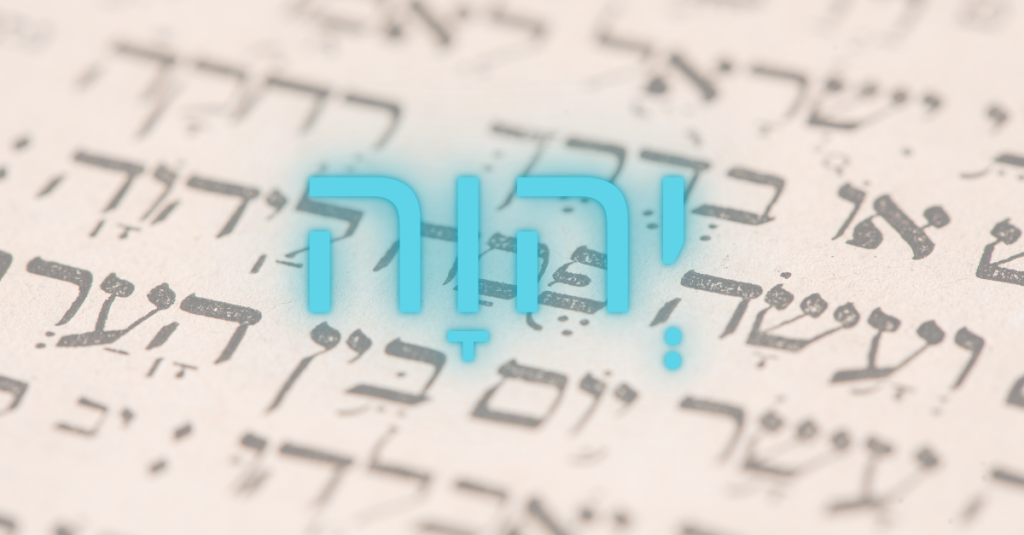The Hebrew Bible (Tanakh) reveals a God with many names, and each one highlights a unique facet of divine character: power, compassion, eternal presence, or awe-inspiring holiness. These aren’t just labels—they’re experiences, emotions, and truths wrapped in sound.
So let’s explore the seven most sacred Hebrew names for God—along with their meanings, how they appear in scripture, and why they matter.
1. YHWH – יהוה (Yud-Heh-Vav-Heh): The Unspeakable Name

Pronounced as: Yahweh (though traditionally not spoken aloud)
You might have seen it written as YHWH, or in Hebrew, יהוה—a name so holy that it’s never uttered aloud in Jewish tradition. Instead, readers will say Adonai (אֲדֹנָי) or HaShem (הַשֵּׁם)—”The Name”—as a respectful substitute.
In Exodus 3:14, when Moses asks God for His name, the response is:
“Ehyeh Asher Ehyeh” (אֶהְיֶה אֲשֶׁר אֶהְיֶה)
“I Am That I Am.”
The name is derived from the Hebrew root meaning “to be,” and its original meaning is often interpreted as “He-Who-Is” or “He who brings being into being”.
Due to its sacred nature, the exact pronunciation of יהוה is uncertain, as there was a longstanding Jewish prohibition on speaking God’s name aloud. Instead, Jews typically substitute it with terms such as:
2. Elohim – אֱלֹהִים: The Mighty Creator
Pronounced: Eh-loh-HEEM
This name shows up right out of the gate in Genesis 1:1:
“Bereishit bara Elohim…” (בְּרֵאשִׁית בָּרָא אֱלֹהִים)
“In the beginning, God created…”
Interestingly, Elohim is grammatically plural, but it’s usually treated as singular when referring to the God of Israel. Many scholars think this reflects majesty, fullness, or even a nod to the complex nature of God.
3. Adonai – אֲדֹנָי: The Reverent Substitute
Pronounced: Ah-doe-NAI
When reading Torah, instead of saying YHWH, people will say Adonai, which means “My Lord”. It’s personal, yet reverent. You’ll see this substitution most often in liturgical settings or Torah reading.
Adonai carries the warmth of relationship with the respect of lordship. It’s the way many Jews experience the divine in prayer and scripture.
4. El Shaddai – אֵל שַׁדַּי: God Almighty
Pronounced: El Shah-DYE
This name pops up in Genesis 17:1, where God appears to Abraham:
“Ani El Shaddai” (אֲנִי אֵל שַׁדַּי)
“I am God Almighty.”
El (אֵל) means “God,” and Shaddai (שַׁדַּי) is often translated as “Almighty,” though some believe it hints at nurture or sufficiency (from shad, meaning “breast” in Hebrew). It paints a picture of both strength and provision.
5. El Elyon – אֵל עֶלְיוֹן: God Most High
Pronounced: El El-YONE
This title exalts God as supreme, above all earthly and heavenly powers. It appears in Genesis 14:18-20, when Melchizedek blesses Abram:
“Baruch El Elyon” (בָּרוּךְ אֵל עֶלְיוֹן)
“Blessed be God Most High.”
El Elyon emphasizes God’s transcendence—above kings, nations, and circumstances.
6. El Olam – אֵל עוֹלָם: The Everlasting God
Pronounced: El Oh-LAHM
When Abraham plants a tree in Beersheba, he calls on El Olam, meaning “The Everlasting God” (Genesis 21:33). This name highlights God’s timelessness—He’s not bound by our clocks or calendars.
The Hebrew word olam (עוֹלָם) implies something without end, sometimes translated as “forever” or “eternity.”
7. HaShem – הַשֵּׁם: “The Name”
Pronounced: Ha-SHEM
This isn’t one of the “original” names of God in scripture, but it’s deeply important in modern Jewish life. HaShem, literally meaning “The Name”, is how many Jews refer to God in everyday conversation without saying YHWH.
Example:
“Baruch HaShem” (בָּרוּךְ הַשֵּׁם) – “Blessed is the Name” or “Thank God!”
Many Names, One Divine Essence
The main reason that god has so many names is to reveal different aspects of His nature: Each name highlights a specific attribute or characteristic of God, providing a more comprehensive understanding of His complex nature. For example, “El Shaddai” emphasizes God’s almighty power, while “Yahweh” (YHWH) represents His eternal self-existence. The use of multiple names for God is not unique to any single religion but is a common feature in many faith traditions, reflecting the human attempt to comprehend and relate to the divine in its fullness.

